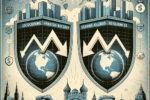Lima, Peru – The world of literature mourns the loss of renowned Peruvian author Mario Vargas Llosa, who passed away at the age of 89. A towering figure in Latin American letters, Vargas Llosa was celebrated for his prolific writing career, which included iconic works such as “The Time of the Hero” and “Feast of the Goat.” In 2010, he was honored with the Nobel Prize for Literature for his profound exploration of power structures and individual resilience in his works.
Vargas Llosa’s children, Álvaro, Gonzalo, and Morgana, confirmed the news of his peaceful passing in Lima. Reflecting on their father’s legacy, they expressed hope that his enduring body of work will continue to resonate with readers around the world long after his departure.
A close friend and lawyer of the author, Enrique Ghersi, shared fond memories of Vargas Llosa’s last birthday celebration, highlighting the joy and camaraderie that marked the occasion. Ghersi painted a picture of a man who lived a rich and meaningful life, leaving behind a profound literary legacy.
The literary journey of Vargas Llosa began with the publication of his first collection of stories, “The Cubs and Other Stories,” in 1959. However, it was his groundbreaking debut novel, “The Time of the Hero,” that catapulted him to literary stardom in 1963. His bold storytelling, often drawing on real-life experiences, earned him a place among the influential voices of the Latin American literary movement known as the “Boom,” alongside luminaries like Gabriel García Márquez and Carlos Fuentes.
Despite facing challenges early in his life, Vargas Llosa’s dedication to his craft never wavered. From his humble beginnings as a part-time crime reporter to his later years as a revered novelist and essayist, he remained committed to the pursuit of literary excellence. His sharp political commentary, reflected in his columns and novels, showcased his unwavering commitment to personal and economic freedoms.
Throughout his storied career, Vargas Llosa’s writing was imbued with a deep connection to his Peruvian roots. Despite living abroad for significant periods, he always found inspiration in his homeland’s complex tapestry of history and culture. His work delved into themes of power, identity, and societal change, offering readers a nuanced perspective on the intricacies of the human experience.










